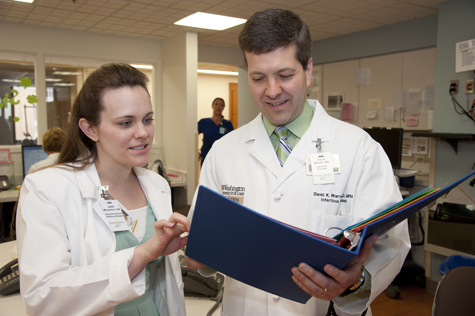
Potentially deadly infections with obscure names, such as MRSA and H1N1, have become part of the public lexicon.
These infections cause particular concern in hospitals and clinics, where they can spread rampantly. David Warren, MD, medical director for infection control at Washington University School of Medicine and Barnes-Jewish Hospital, works diligently to prevent infections, but when they do occur, he pulls out all the stops to halt their spread.
Warren keeps a watchful eye out for infections that develop almost exclusively in hospitals. Critically ill patients, whether young or old, are most at risk. They often have tubes in their veins to deliver medicine, in the bladder to remove urine, or in their lungs to supply oxygen, creating an ideal environment for bacteria to flourish and infections to develop.
And in a world that is increasingly interconnected, Warren also must keep abreast of emerging global epidemics that have the potential to wreak havoc if there’s a local outbreak.
“New challenges arise every day,” says Warren, an infectious diseases specialist and associate professor of medicine. “The most difficult aspect of that reality is that you can’t easily predict what the next threat will be, but that means there’s never a dull moment, either.”
Warren, who widely is recognized for his infection-prevention efforts, operates in what can be a high-stress environment. His colleagues say that even under pressure, he maintains his composure and thinks with a clear head, all the while reassuring patients and staff and bringing situations under control.
“David is an extraordinary individual because at the height of a crisis, he remains incredibly calm,” says Vicky Fraser, MD, interim chairman of the Department of Medicine and the J. William Campbell Professor of Medicine.
“In some situations, there are unusual infections that are incredibly difficult to identify and evaluate, but David is extremely meticulous and careful in his approach,” she says. “He always gets to the root of the problem and identifies a solution, and he is responsible for many of the dramatic improvements in infection rates at the medical school and at Barnes-Jewish Hospital.”
A love for science
Growing up, Warren developed an early love for science. He originally planned to pursue a doctorate and a career doing bench research. But in college, a summer internship at the National Institutes of Health (NIH) changed his focus.
Warren worked in a laboratory making the first attempts to use gene therapy to treat severe combined immune deficiency, or SCID. This rare, inherited disorder typically is diagnosed in infancy and caused by a genetic error that destroys the body’s ability to build a functioning immune system.
Warren found the research interesting, but what he most enjoyed about his summer experience was tagging along with a pediatrician from the lab who moonlighted as the on-call pediatrician at a local community hospital.
The life of the hospital opened up a new world for Warren. He attended the deliveries of babies and a hodgepodge of pediatric emergencies.
“It was fascinating, and I found the whole idea of taking care of people and having an immediate impact on their lives to be very appealing,” Warren says. “So I changed tracks and went into medicine.”
After graduating from medical school, Warren chose Barnes-Jewish for his internal medicine residency. When he interviewed for a slot, he was swayed by the close working relationship among faculty physicians and residents.
“There’s a real sense of camaraderie, and that was the deciding factor in my decision to come here,” Warren says.
During his residency, Warren gradually gravitated toward infectious diseases. It fed his intellectual curiosity, and he enjoyed following a detective’s trail to make a diagnosis.
“Infectious diseases is not a procedure-based specialty,” Warren says. “We spend a lot of time talking to patients and hearing about their lives, looking for the small, revealing details that provide important clues to help us determine what they were exposed to.”
Finding out what patients do for a living, where they have traveled, what they have eaten and what their hobbies and lifestyle are can be vital to a diagnosis, he says.
Warren has diagnosed a number of curious infections over the years, including a steady stream of tick-borne illnesses. Missouri is known for its ticks and has one of the highest U.S. rates of tularemia, a bacterial infection spread by ticks and deer flies.
A fungal infection, histoplasmosis, also is quite common in the Mississippi River Valley, even among people who are healthy. And it is not out of the question to see tuberculosis or even cases of malaria in patients who have traveled abroad.
Honing an expertise
After an infectious diseases fellowship at the School of Medicine, Warren joined the faculty in 2001. Since then, he has honed his expertise in diagnosing and preventing health-care-associated infections.
Even though hospital stays are shorter and less frequent, patients are typically sicker and more vulnerable to infections. These include patients in the intensive care units, those with cancer and patients having surgery.
The infections that are most worrisome are those caused by strains of bacteria that are resistant to many antibiotics. These super bugs were rare decades ago but have grown increasingly common today. They include methicillin-resistant Staphylococcus aureus (MRSA) and vancomycin-resistant enterococci (VRE). Another is the bacterium Clostridium difficile (C. diff), which causes severe diarrhea and typically develops after patients have been taking antibiotics.
“These bacteria can cause severe infections and sometimes even death,” Warren says. “And they really limit our choice of treatments. Instead of being able to prescribe an antibiotic that would be most effective, we’re faced with having to use antibiotics that potentially have more side effects, are more expensive and may not work as well.”
Part of Warren’s job is to be sure that hospital staff, including physicians, nurses and even housekeepers, are trained in infection prevention and that they consistently follow practices that have been shown to reduce infections.
Sometimes these practices are extremely low-tech, such as hand washing. But it is critical because bacteria easily can spread on the hands of health-care workers.
Warren’s own research has shown that bathing patients in the intensive care unit with soap that contains a particular antiseptic, chlorhexidine, can significantly reduce transmission of MRSA. First evaluated in the Barnes-Jewish medical and surgical ICUs, the soap was so effective at reducing new infections that it was incorporated into routine use in all of the hospital’s ICUs.
“The nurses were already bathing the patients every day, but we found that it’s what they bathed them with that made all the difference,” he says.

Warren also was the senior author of updated guidelines issued recently by the Infectious Diseases Society of America for the prevention and treatment of catheter-related bloodstream infections. The comprehensive guidelines, written for physicians, cover virtually every aspect of bloodstream infections in a host of different patients and are widely cited in the scientific literature.
For Jonas Marschall, MD, assistant professor of medicine, Warren is more than an expert in his field but a mentor who has guided his career.
In 2006, Marschall came to the School of Medicine from Switzerland for a research fellowship in health-care epidemiology with a focus on hospital-acquired infections. Before he arrived, he had to choose a mentor with only a limited knowledge of the faculty. Marschall selected Warren, and the choice couldn’t have been a more perfect fit, he says.
“Right from the start, he was a wonderful, caring mentor,” Marschall says.
“David also is one of the most diligent clinicians I’ve ever seen. He’s very comprehensive and considers all aspects of the patients’ care. We all benefit from his expertise.”
Fast facts about David Warren
Grew up in: Pittsburgh
Education: BS, Penn State; MD, University of Pittsburgh; MPH, Saint Louis University
Family: Wife, Corinna, MD, an internal medicine physician at St. Luke’s Hospital in Chesterfield, Mo.; daughter, Julia, 10; and son, Adam, 7
Hobbies: Bicycling, hiking and spending time with family outdoors
Favorite Missouri state park: Ha Ha Tonka in Camdenton, Mo.
Favorite family getaway: The beaches of St. Petersburg and Clearwater, Fla.